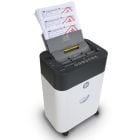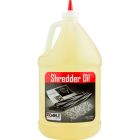Paper Shredders and Your Liability
Whether you manage a school, business, charity, or church, people entrust their personal information to you. They do so believing you will safeguard their information. If your clients, employees, donors, and others believed you were not handling their data properly, they would no longer want to work with you. After all, would you want to do business with someone you knew was not taking reasonable steps to protect you?
Some industries have a greater burden of information security imposed on them by state and federal regulatory agencies and laws. The Health Insurance Portability and Accountability Act that went into effect in 1996 was the first federal legislation enacted to safeguard our health information and records. In 1998, the Gramm-Leach-Bliley Act went into effect to ensure financial institutions properly protect sensitive data. Another piece of legislation that is not industry specific is the Sarbanes-Oxley Act of 2002. This legislation requires that affected public companies perform checks on their internal controls and provide data on their effectiveness. Failure to comply with these types of laws can lead to court, fines, and suspension of licenses. Compared to these, the cost of purchasing and maintaining a paper shredder is more than worth it.
In addition to the legislative implications of improperly managing sensitive information, there is the judicial angle. You and your business definitely do not want to endure the potential nightmare that could result from documents that are not properly disposed of. If your customers' or employees' personal data is not protected, then you are not protected. If you fail to take reasonable and prudent steps to safeguard the information entrusted to you, those victimized by your lack of vigilance may sue you and your firm.
Lawsuits can be costly in more ways than one. Not only must you pay court filing fees and hire attorneys, you will lose productivity at work. You will almost certainly lose customers as word gets out about your failure to protect clients and employees from financial predators and identity thieves.
The single most important step you can take towards safeguarding information is to invest in a paper shredder and use it regularly. Fortunately, protecting information becomes easier all the time as paper shredders are improved. Paper shredders destroy sensitive documents in a variety of ways. The most common means are through strip cutting and cross cutting. Generally speaking, documents destroyed through cross cutting are more secure simply because they are cut into smaller pieces. These smaller pieces also take up less room in the trash. Cross cut shredders require more maintenance than strip cut machines, and they may cost about ten percent more. The right machine for your office will depend on the volume of paper you will need to shred and the level of security you will require from the equipment. Paper shredders are available in a range of styles, sizes, and prices to serve all sorts of needs. Before buying one, take some time to think about how your firm will use the equipment. Base your decision on your business needs and your responsibility to customers, employees, and donors.









